Part of the blog series for the 2017 theme, Radical Ritual.
Ritual, like voting, has gotten a bad reputation in Western culture.
When we first presented “Radical Ritual” as a theme, many people rolled their eyes or accused us of endorsing a poorly defined New Age spiritualism (as if there were any other kind). People who went to college denied that there is even such a thing as secular rituals, despite having participated in multiple graduation ceremonies.
But “ritual” does not imply a specific kind of belief about the universe any more than a “book” implies any particular content. Books are means of conveying information, and the form itself is equally suited to poetry and particle physics.
In this vein we have looked at “ritual” purely as a material phenomenon. Like other material phenomena (such as the architecture of buildings or the existence of printing presses), rituals can have profound implications for your psycho-spiritual development. This is, to be sure, what they’re famous for — the classic song that everyone in the crowd shouts at the band to do all through the show. But “ritual” itself, not “a mass” or “a circumcision” or “standing for the national anthem,” has functions and properties outside of whatever beliefs could be conveyed through it.
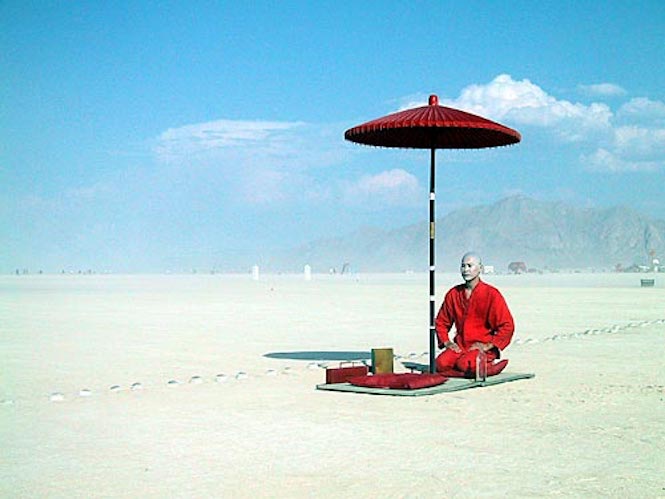
Tell Me Why I Should Care
Ritual shapes your world. Even in its most rote form, ritual has basic functions:
- It impacts what we pay attention to. Ritual emphasizes certain aspects of our lives over others, and as anthropologist Tanya Luhrmann showed us, this has a significant impact on what we believe is basic to the world.
- It encodes values (although the more rote it is, the less effectively it does so — who hasn’t wanted to rebel against an empty cultural gesture?) To some extent the health of our culture can be gauged by the health of our rituals.
- It provides common reference points for people who otherwise have little in common, and therefore both creates and designates community. Your real community is not the people who believe the things you do, but the people with whom you have common practices.
To no small extent, the world you live in is a product of the rituals you perform.
That in and of itself is worth looking at, and is a pretty important aspect of both Burning Man and the default world. But that’s also ritual at its most basic.
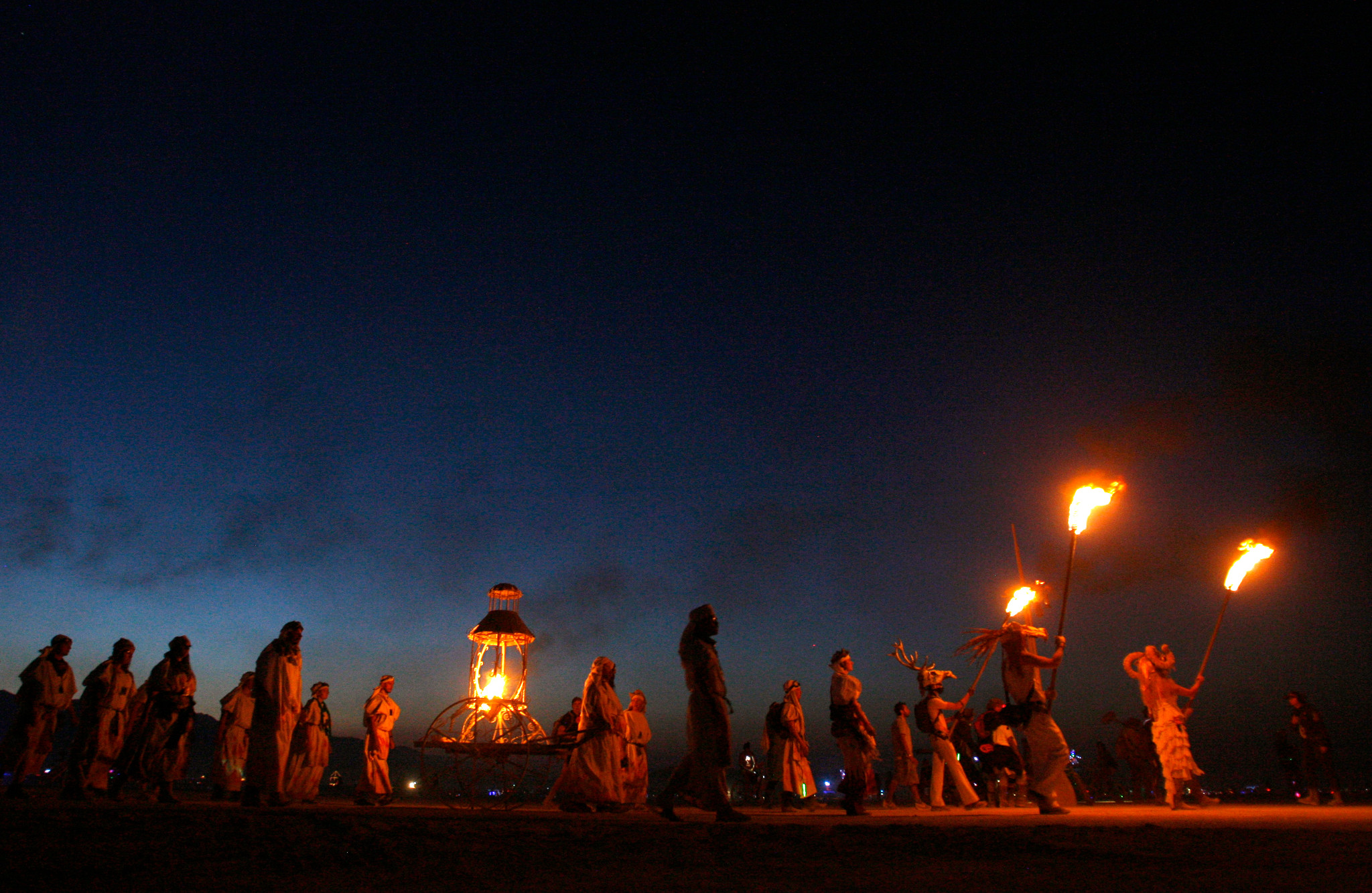
What the Hell is “Radical” Ritual?
Beyond that, however, there is an additional capacity of ritual — and this is what I think really deserves the term “radical ritual” — to prepare the physical world around us for psychological states that are hard to reconcile with daily life. Experiences of awe and wonder, flow states, connecting to parts of your psyche (and perhaps through them, the universe? Who knows?) that you don’t understand. These are all things that are important to us … the things in life that we strive for and value and cherish … but that are also most hard to come by.
Ritual isn’t necessary for any of these things, but it makes them more achievable. Ritual is a tool; done right, it facilitates these experiences. The purpose of Radical Ritual is precisely to take us outside of the ordinary and give us access to the wild, unpredictable, psychological states that are fundamental to our humanity and yet increasingly hard to fit in to the modern world, where everything is cut and measured, customized and sanitized, to give us a satisfactory experience of customer service — and any aberration from a relatively narrow range of acceptable social experiences (however “wild” and “outré” they are marketed as) is factored out by both social custom and algorithm. Radical Ritual breaks us out of emotional uniformity.
The effect of these kinds of rituals — of “radical” rituals — not only produces these psychological states, but enhances the impact of conventional ritual: of what we pay attention to, of encoding values, of providing common reference points. Indeed, there is evidence to suggest that it can intensify all these processes, having the equivalent effect on the psyche that an intense immersion period does for language acquisition.
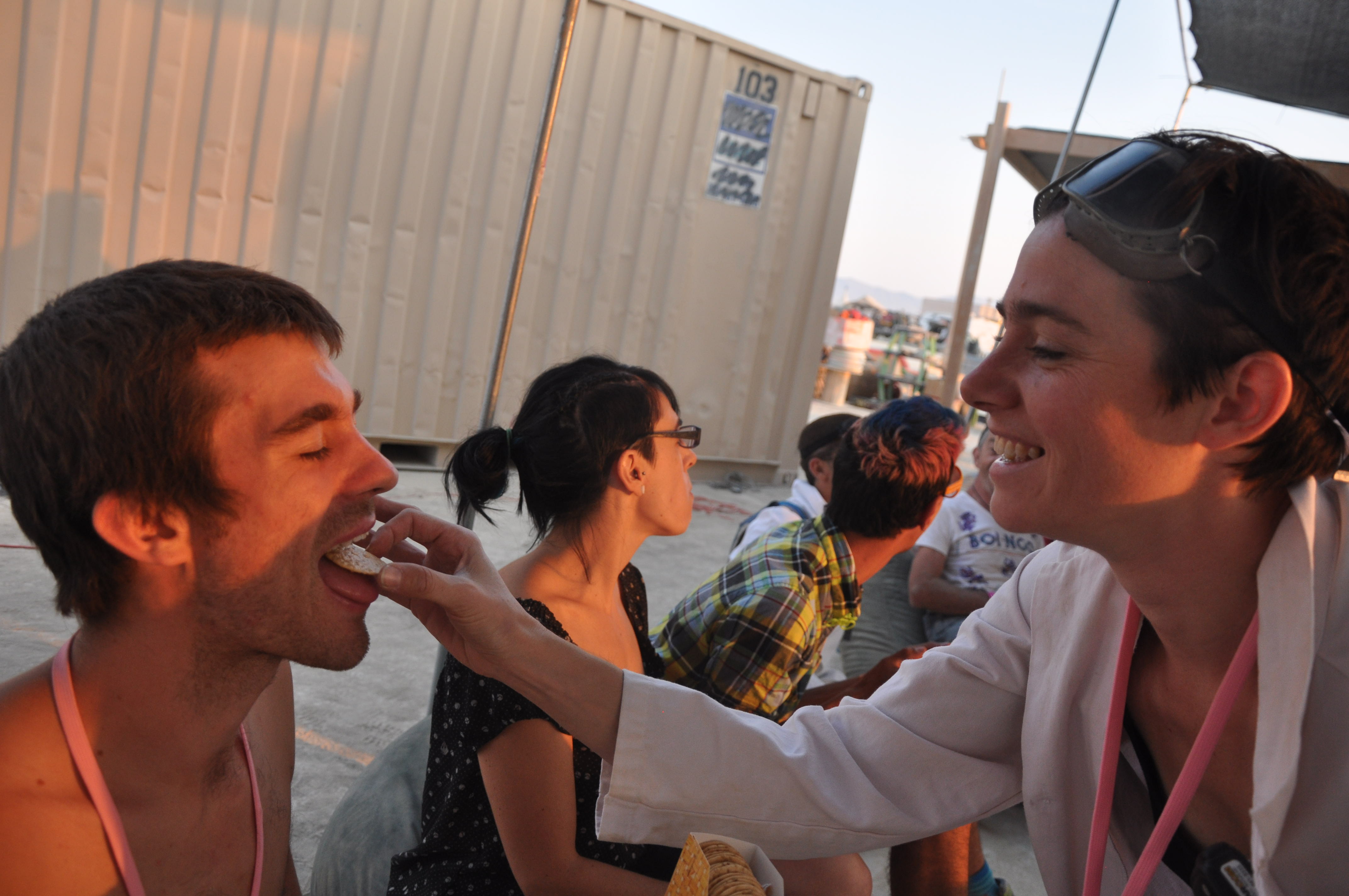
Get Out of Your Head and Into Your Ritual
What makes that happen? Here theory is guided wholly by practice. What gets you into a flow state? We should be cautious with this because despite the pretenses of any given ritual to universality, it seems pretty obvious that no ritual works for every person. (Even ours.) Different people will respond differently to different stimuli. There may be many doors through which one accesses a flow state, each with its own key.
When we talked to ritual practitioners, they emphasized this particularity, rather than any universality. The issue we heard was never about what the objects or settings involved intrinsically meant but what they meant to them. The issues weren’t alchemical in the sense of chemistry but alchemical in the psycho-symbolic sense: What puts you in the proper state to experience something greater than yourself? Whatever that is, that’s what your community should put in their ritual, and you should engage in it not as a spectator but as something you throw yourself into, full-bodied.
That sense of accessing something greater than the conscious self is a crucial commonality. William James wrote that religion fundamentally requires a connection to a “larger power” — “both other and larger than our conscious selves” — and that anything larger will do, so long as you can trust it for the next step you take. This very much seems to be the case when reaching states of awe through ritual. Whatever it is people are trying to reach out to, or connect with inside themselves, it is described as greater than the conscious self, and unpredictable — unquantifiable, unable to be expressed as a formula that will tell you what’s going to happen next.

Perform at Your Own Risk
Perhaps this is why Kirk Schneider, a psychologist whose recent research has specialized in the experience of awe, says that an effective ritual to reach a state of awe would likely involve some kind of risk. It doesn’t necessarily have to be dangerous, but it shouldn’t be safe, either. It is when everything is under control, and nothing surprising will happen, and we can be sure that no one will be challenged or frightened or confronted with a stark truth, that we feel most dead inside. The goal of Radical Ritual is to access states that come with risk. Physical perhaps, but certainly psychological and spiritual. In this sense, the impossible scale of the cosmos is the psychological equivalent of the burning bush — we cannot look directly at it, but we can be in awe of its presence, and be changed.
Ritual is not the only way to do this, of course. Art can also frequently have the effect, as can exposure to nature. So can large communal activities. And surely it’s not lost on anyone at this point that Burning Man contains all of these, at great scale and with enormous variety.
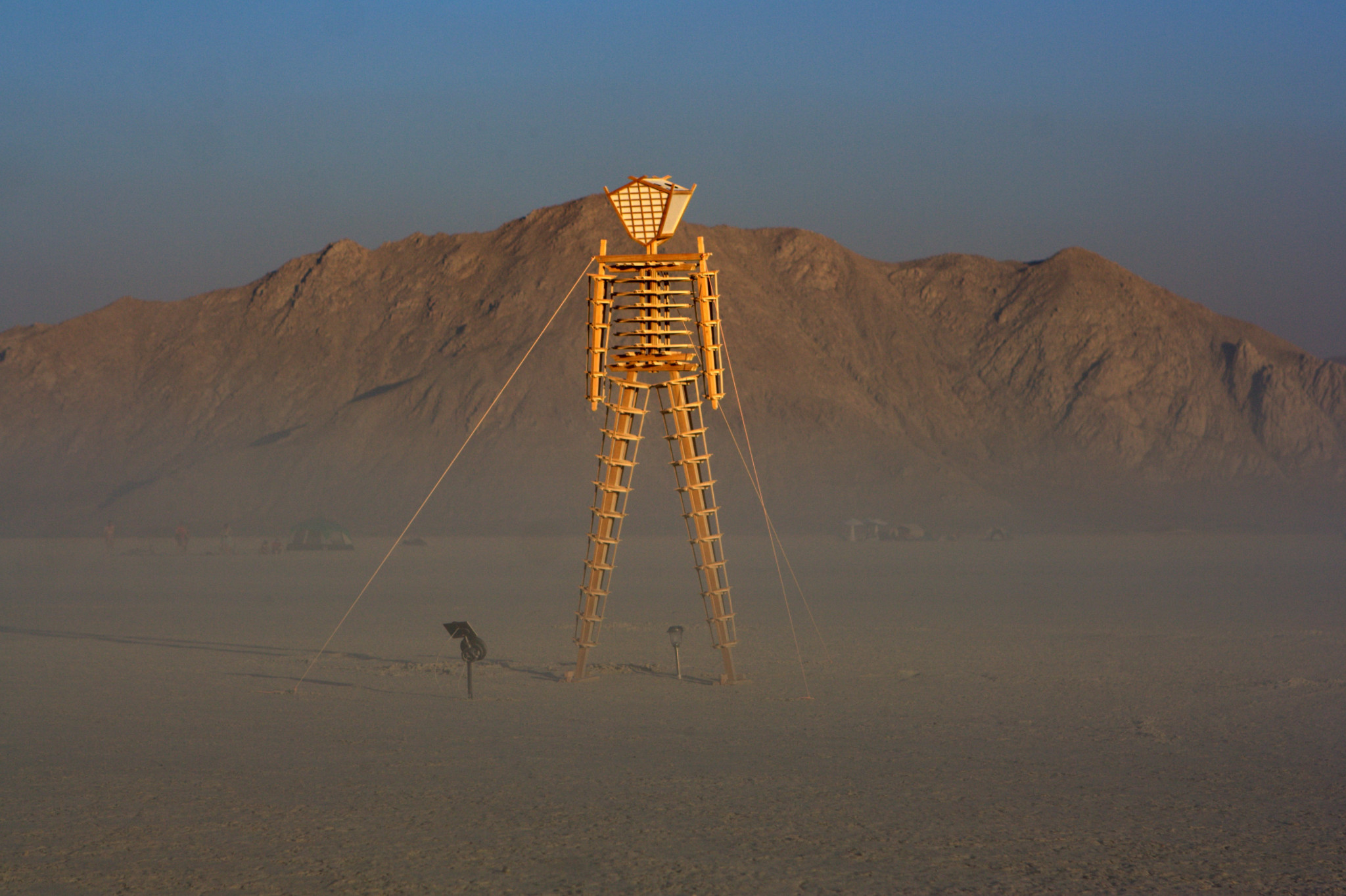
Build Your Own Man
Burning Man not only is a “radical ritual” unto itself; it contains multitudes of radical rituals, and they in turn contain art and communities, and are held in a stark natural setting of great beauty and danger. The cumulative effect, as anthropologist and Burner Megan Heller suggested, is that Burning Man is an incredibly potent catalyst for psycho-spiritual experiences. It’s not just that you are surrounded by art, in a place of natural beauty, full of communal activities. It’s that you have the choice to engage in acts of intrinsically motivated play through this panoply of carnivals until you find the ones that you want to try, that speak to your psyche, that offer risks which you find compelling. Both the overall atmosphere, and the degree of specificity with which you can make a meaningful choice about what you’re going to do (not “watch” but “do”), create the conditions to have an intensive and unpredictable experience of awe, flow, and the exposure to something (whatever it is) greater than the self.
In this regard, the success of Burning Man may speak not just to the genius of the community which created Burning Man’s culture organically, without blueprint or master plan (indeed, which often rebelled against any such agenda), but to the profound need our society has for these experiences. Western society, having tossed most of its radical rituals away as either superstitious or not commercially viable or in need of an antiseptic make-over, is now hungry for awe, hungry for spirit and soul, hungry for meaningful connection.
There is no single radical ritual that can fix this. But understanding why radical ritual is important, and what makes it potent, can help individuals create their own, and communities form around them.
Build your own Man. Or, if there’s something more impactful for you, do that. Pay attention. Invite others. Be surprised.
Just don’t go through the motions.

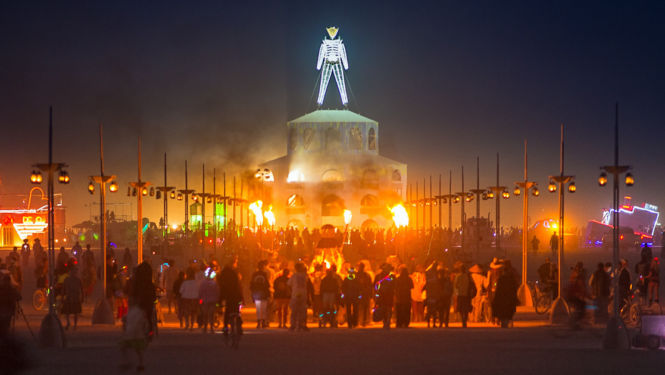
I don’t disagree though I think there is a swirling cloud of cognitive dissonance around the theme every year. This theme must make sense because I’m going right? I sort of liked the more literal themes like Floating World and Caravanary which was supposed to be Silk Road but….
Keep the the thoughtful analysis.
Report comment
I thought there could never be a more offensive and less interesting theme than last year’s “Praise Be to the Parasite Moneyed Class”, but damn, this year’s “Hippy Bullshit Oom Shakalaka” truly takes the sacramental wafer. At least last year had Da Vinci as a visual cue. Just listening to the honorarium podcasts, every other art piece is some nonsense altar to sacred self-involvement and grief. What happened? is Larry going through some late-life yoga conversion, so we are all forced to sit around and listen to the “look-at-me” Spiritualists discuss their latest Instagram kundalini prayer pose? I’m serious. Is Larry okay? In my experience, when people turn to mysticism, they tend to be having serious problems in their lives.
But I suppose this is the conversation Larry wanted to have this year, as spirituality was the focus of last year’s Census. Of course, that census showed that very, very few Burners are interested in Larry’s Spiritual Transmogrification.
It’s okay. We will still have a great year. There’s much work to be done – things to build and destroy. We will just have to work a little harder to avoid the hordes of molly-addled EDM tourists playing at praying and pretending that they are being transformed (and transforming the world!) when the beat drops.
I can only hope that some of that glorious Burning man snark will shine through the Year of Shrines to Self-Obsession. More virgin sacrifice, less yoga prayer hands!
Report comment
It’s interesting that you assume ritual has to have something to do with a reality outside or transcending your self. You do realize your repeated trips to Burning Man are a ritual. You religious dedication to a right way to view things, a right way to do things, the correct level of snark and nihilism, are all ritualistic in nature. Rituals aren’t about bringing something into existence that isn’t there to start. Rituals are about revealing what is already there, but obscured by faulty perceptions. Rituals are about being stripped of illusion and becoming what you are. That doesn’t have to be about God, or spiritualism. Anyone who doesn’t think they are deluded is deluded. Ritual is a great way to wake up.
Report comment
Boondog, my favorite sacred intrusion was when I was visiting an neighboring camp, just to say ‘HI’. I accidentally entered their sacred circle, prompting the elders to come out a tent where they were in deep spiritual meditation. The elders didn’t look at me, but rather spoke to the underlings that an intruder has entered. This signaled the underlings to try to nudge me out of the circle. I couldn’t tell where the border of the holy circle was, so I asked. It was a placement of the little black rocks, that’s all. So now imagine this scene unfolding all week, where they do this to countless visitors. Until there are no more visitors.
Report comment
Boondog,
1) Listening to the Honorarium podcasts was your mistake, you should have more self-respect than that.
2) As a core census volunteer I can tell you that almost half of your fellow burners identify as “spiritual, not religious”, while only 6% say they are religious. Atheists and Agnostics combined make up about 40% of the population. I don’t know what those numbers would be for the general population, but it seems pretty obviously to me that “spiritual, but not religious” is one of the defining traits of burners, which means lots of them are interested in Larry’s late life crisis.
3) Thanks for informing me that Larry writes the Census questions. These assholes I work with at Census Lab have always told me that it was combination of obvious questions of interest for the Org and more exploratory questions from academics who study Burning Man. I had assumed all those census questions about transformation were written by Dr. Megan Heller who wrote a really interesting dissertation about Play and Transformation at Burning Man, including a whole chapter on heckling and snark, but wow, I guess not.
Report comment
The ritual isn’t the problem. I have a ritual of feeding my cat in the morning. The problems come from people assigning beliefs and meaning to whatever ritual. Then there’s the group-think that follows. You see it a lot on the playa. It’s annoying.
Report comment
Thank you for this article. As someone who has helped people create personalized rituals at Burning Man for many years, I love the theme, and I very much appreciate and share your perspective on what ritual is.
To me, ritual, at its most basic, is a way to set something – a time, place, action, phrase – apart as special in some way, to give it meaning and purpose that it wouldn’t without some special attention. In the wise words of Robin Wall Kimmerer, in the wonderful book “Braiding Sweetgrass”: “Ceremony [or ritual] focuses attention so that attention becomes intention.” What is required to do this depends on the person and the situation. It might be as small an act as taking off your shoes before stepping into a place. Or it might require burning something to the ground.
An element of risk is important, too, as you note, both because it shakes us out of our “normal” mindset, and because it makes our investment in this space of focused intention that much greater – it is a statement of commitment to our intention.
Kimmerer’s full discussion of ceremony might be of interest:
“Ceremony focuses attention so that attention becomes intention. If you stand together and profess a thing before your community, it holds you accountable.
“Ceremonies transcend the boundaries of the individual and resonate beyond the human realm. These acts of reverence are powerfully pragmatic. These are ceremonies that magnify life.
“In many indigenous communities, the hems of our ceremonial robes have been unraveled by time and history, but the fabric remains strong. In the dominant society, though, ceremony seems to have withered away. I suppose there are many reasons for that: the frenetic pace of life, dissolution of community, the sense that ceremony is an artifact of organized religion forced upon participants rather than a celebration joyfully chosen.
“The ceremonies that persist – birthdays, [graduations,] weddings, funerals – focus only on ourselves, marking rites of personal transition. …
“Many indigenous traditions still recognize the place of ceremony and often focus their celebrations on other species and events in the cycle of the seasons. In a colonist society, the ceremonies that endure are not about land; they’re about family and culture, values that are transportable from the old country. Ceremonies for the land no doubt existed there, but it seems they did not survive emigration in any substantial way. I think there is wisdom in regenerating them here, as a means to form bonds with this land.
“To have agency in the world, ceremonies should be reciprocal cocreations, organic in nature, in which the community creates ceremony and the ceremony creates communities. They should not be cultural appropriations from Native peoples. … [Ceremonies should include] an active, reciprocal relationship with the more-than-human world.”
– Robin Wall Kimmerer, Braiding Sweetgrass, pp. 249-50
Report comment
dissent and widespread disregard for the theme is our ritual. but this year its gonna be radical, my dude
Report comment
The first paragraph says that “people who went to college”, bla bla bla. Really? This is a blanket statement and a generalization. So “people” who went to college deny existence of secular rituals? Is this why “burners” dislike those who prefer an education as opposed to being ignorant? Thanks for your words. You just answered a few of my questions about this “unfestival”.
So glad I decide not to pay hundreds to participate in this.
Sincerely
A college graduate.
Report comment
Comments are closed.